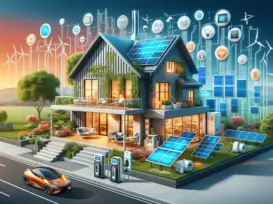Grus Home Energy - Renewable Energy Technologies
Innovative Renewable Energy Technologies Shaping a Sustainable Future
Innovative Renewable Energy Technologies Shaping a Sustainable Future
As the global community confronts the urgent need to reduce greenhouse gas emissions and combat climate change, renewable energy technologies are taking center stage. These technologies harness the power of natural resources such as the sun, wind, water, and biological processes to generate electricity and heat, providing a sustainable and eco-friendly alternative to fossil fuels. With advancements in science and engineering, the landscape of renewable energy has seen transformative innovations that promise to reshape our energy future.
Solar power has experienced remarkable improvements in efficiency and cost-effectiveness. Solar photovoltaic (PV) cells, which convert sunlight directly into electricity, have undergone significant technological enhancements. New materials, such as perovskites, are being researched for their potential to surpass the efficiency of traditional silicon-based cells. Moreover, the integration of solar technology into building materials, known as building-integrated photovoltaics (BIPV), is enabling the construction of energy-generating structures without the need for separate solar panels.
Wind energy has also seen substantial progress with the development of larger and more efficient turbines. These advancements have not only increased the power output of individual turbines but also allowed for the creation of offshore wind farms, where wind speeds tend to be higher and more consistent. Floating wind turbines are an emerging technology in this sector, which enables wind farms to be located further out at sea, harnessing even greater wind resources while reducing visual impacts on the landscape.
The realm of hydropower is evolving beyond traditional dams to include tidal and wave energy. These technologies leverage the kinetic energy of ocean currents and the rise and fall of tides to produce electricity. One of the advantages of tidal and wave power is its predictability, which contrasts with the variability of solar and wind resources. Innovations in this area include dynamic tidal power, which creates a dam-like structure perpendicular to the coast, capturing energy from tidal currents on a large scale.
Furthermore, bioenergy technologies are undergoing a renaissance with advancements in biomass conversion methods. Second and third-generation biofuels, made from non-food biomass and algae, respectively, offer sustainable alternatives to conventional biofuels and minimize competition with food production. Innovations in biogas production, through the anaerobic digestion of organic waste, are improving efficiency and expanding the types of waste that can be converted into useful energy.
Geothermal energy, which taps into the Earth’s internal heat, is also advancing with enhanced geothermal systems (EGS). These systems allow for the extraction of geothermal energy from areas where natural reservoirs are not present or are inaccessible. By injecting water into hot rocks and recovering the heated water, EGS opens up vast potential for geothermal power production in regions previously considered unsuitable.
Lastly, energy storage technologies are critical to the integration of renewable energies into the power grid. Innovations in battery technologies, such as solid-state batteries, lithium-sulfur, and flow batteries, are improving energy density, safety, and lifespan. These storage solutions are essential for managing the intermittent nature of renewable sources and ensuring a reliable and consistent energy supply.
In conclusion, the future of renewable energy is bright, with ongoing innovations driving the transition towards a more sustainable and resilient energy system. As these technologies continue to evolve and become more cost-competitive, they will play an increasingly central role in meeting the global demand for clean energy. The array of advancements in renewable energy technologies holds the promise of a sustainable future, with the potential to mitigate climate change and create a healthier environment for generations to come.
Blog, Smart Home Automation , February 17, 2024 , Electric Vehicle (EV) Charging, Energy Consumption Analysis, Energy Management, Energy Savings and Profit, Heat Pumps Optimization, Home Battery Storage, Renewable Energy Technologies, Smart Grid Technology, Smart Metering, Smart Metering Systems, Solar Panels Efficiency, Sustainability in Home Energy
©2025 All Rights Reserved. Grus IoT Co.,Ltd.
